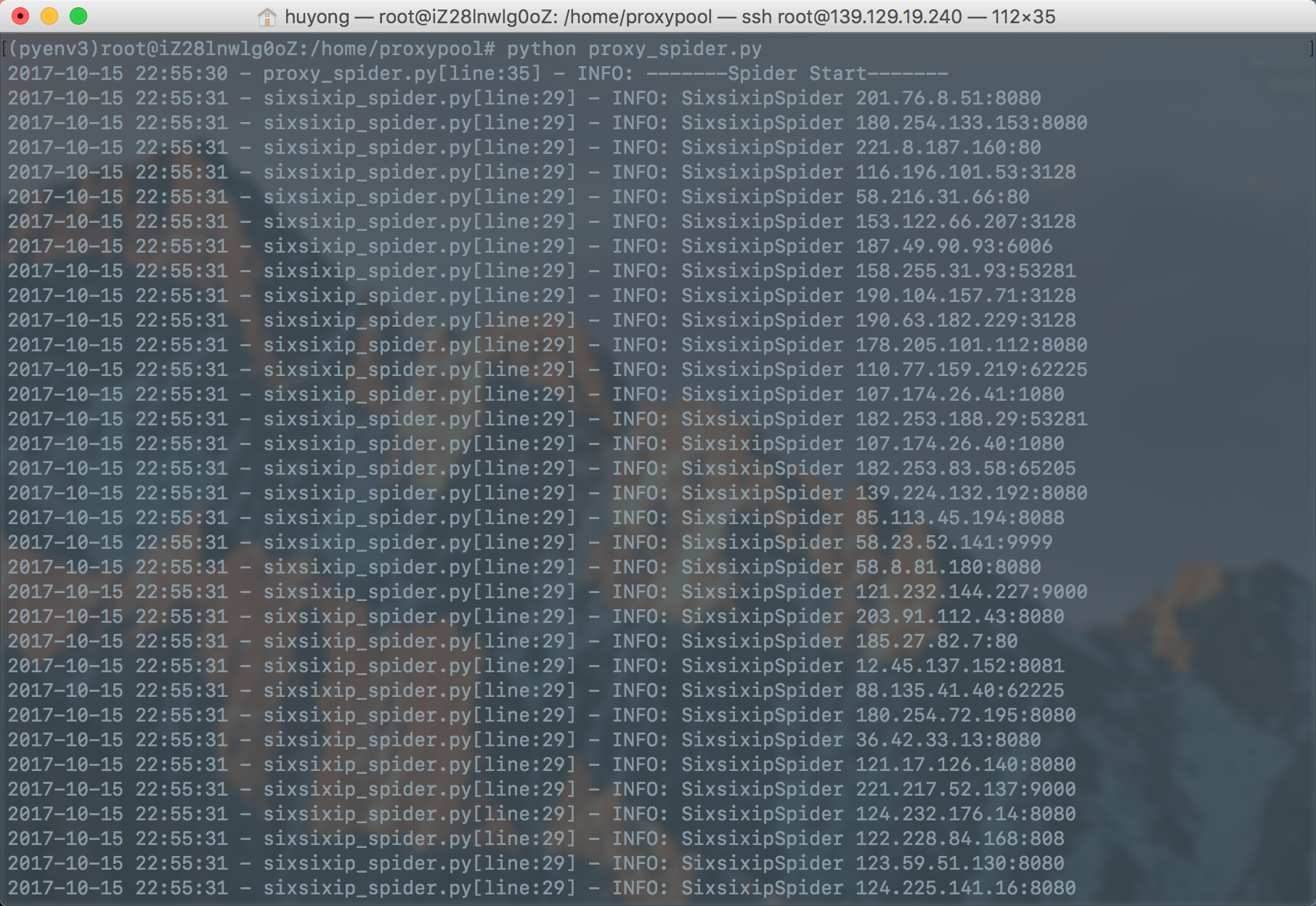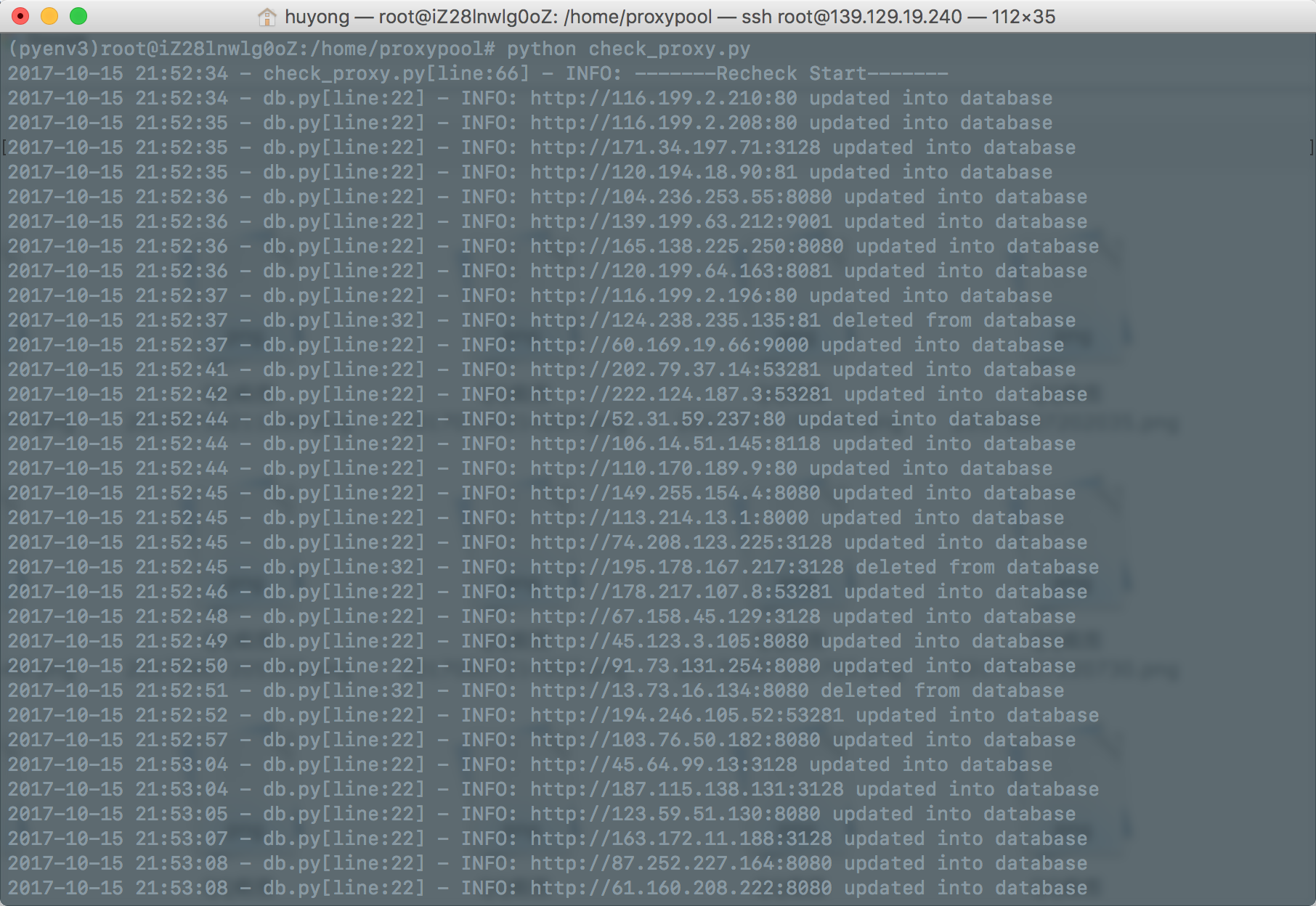Proxypool is a project to spider free proxies and check them whether are still useful in a regular interval. What's more , it provide an open Web-API service: proxypool-open-WebAPI
This project is developed based on python3 and you'd better use virtualenv
# clone project
git clone https://github.com/SimpleBrightMan/proxypool.git
cd proxypool
# install requriements
pip install -r requirements.txt
# run spider
python proxy_spider.py
# recheck proxies
python check_proxy.py
If everything is ok , it may appear the screenshots as follows:
- run spider
- recheck proxies
# run webAPI
python webAPI.py 8080
Then visit http://127.0.0.1:8080,and you can call the Web-API.
In addition, I have deployed this project on my server, it will auto spider and recheck the proxies every 6 hours , the open API URL is :proxypool-open-WebAPI
URL : http://127.0.0.1:8080 or http://proxy.nghuyong.top
Method : GET
Return : json format,liking:
{
num: 692,
updatetime: "2017-10-15 22:49:16",
data: [
{
type: "http",
round_trip_time: 1.38,
ip_and_port: "181.193.73.18:53281",
country: "Costa Rica",
anonymity: "transparent"
},
{
type: "http",
round_trip_time: 0.52,
ip_and_port: "113.214.13.1:8000",
country: "China",
anonymity: "high_anonymity"
},
{
type: "http",
round_trip_time: 0.58,
ip_and_port: "159.82.166.133:8080",
country: "United States",
anonymity: "normal_anonymity"
},
...
]
}
the explanation of the return json args:
| agrs | format | description |
|---|---|---|
| num | int | the sum of the return proxies |
| updatetime | char | the latest update time |
| data | list | proxies data |
| type | char | the type of the proxy |
| round_trip_time | double | the round-trip-time of using the proxy to request the test website |
| ip_and_port | char | the ip and port of the proxy |
| country | char | the country of the proxy |
| anonymity | char | the anonymity of the proxy, this arg can be transparent, normal_anonymity and high_anonymity |
the args for request this Web-API:
- /: it will return all the proxies
- /?country=China: it will return proxies of specific country
- /?type=http: it will return proxies of specific type
- /?anonymity=normal_anonymity: it will return proxies whose anonymity-level are higher than or equal to the query anonymity,and the anonymity-level is :transparent<normal_anonymity<high_anonymity
- /?num=100: it will return the top 100 proxies sorted by anonymity and round-trip-time.
And these query args can be used in a group, for example:/?country=China&anonymity=high_anonymity&num=10 , and it will return 10 proxies whose country is China and anonymity is high-anonymity.
import requests
# request the API,and parse json to dictionary
proxy_result = requests.get("http://proxy.nghuyong.top").json()
num = proxy_result['num']
updatetime = proxy_result['updatetime']
proxy_data = proxy_result['data']
# get a proxy
one_proxy = proxy_data[0]
# add the proxy to a request
requests.get("http://www.baidu.com",proxies={"http":one_proxy['type']+"://"+one_proxy['ip_and_port']})
